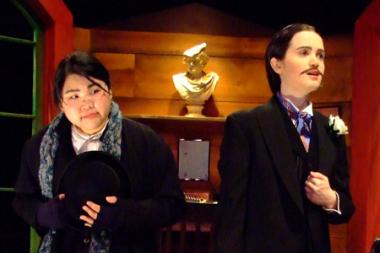An irony frequently recalled in theater circles is that Anton Chekhov called his bleak portraits of isolation, disappointment and despair “comedies.” It’s true that a kind of rueful half-smile plays at the edges of his major dramas—Uncle Vanya, The Seagull, The Three Sisters and The Cherry Orchard—the playwright’s acknowledgement that there’s something faintly ludicrous about his characters’ hopeless dreams and self-inflicted failures.
But Chekhov’s first theatrical successes came from actual ha-ha comedies. Those short pieces, which he called “vaudevilles” after the French farces popular in the 1880s, held up for examination the same kinds of characters who populated his later works—the petty bourgeoisie and minor gentility of 19th-century provincial Russia. While these entertainments are usually overshadowed by the playwright’s tragicomic masterpieces, their staying power is demonstrated in no fewer than three separate Chekhov evenings in the Valley this month and next.
At Mount Holyoke College this weekend, a double bill pairs one of the most popular of the one-act comedies with one of the most rarely performed. They share a thematic similarity in that both revolve around arrangements for a momentous event that is almost scuttled by unforeseen chaos. In “The Proposal,” a young suitor and his intended bride fall to bickering before the engagement is even officially sealed. In “The Jubilee,” a stuffy bank manager and his twitchy clerk, preparing for the company’s anniversary celebration, are thwarted by irrelevant interruptions from two wives.
Brooke O’Harra’s production recalls the boulevardier tradition of the originals, complete with footlights, with the addition of stylized elements from Japanese kabuki theater. The battle of the sexes that activates each plot is both heightened and parodied by the plays’ all-female casts—a standard convention at the women’s college.
Meanwhile, Barry Magnani is rehearsing a student cast at the Pioneer Valley Performing Arts school in Chekhov on the Rocks, with a Twist, an evening of one-act plays and adaptations of Chekhov short stories. The compilation includes another version of “The Proposal,” along with seven others, among them Chekhov’s famous monologue by a secret smoker obliged to deliver an anti-tobacco lecture by his domineering wife; “Drama,” in which a wannabe playwright badgers a famous author into reading her dreadful five-act drama, with fatal consequences; “The Sneeze,” about what happens when a lowly clerk sneezes on the bald head of a government official; and “The Bear,” Chekhov’s best-known one-act, in which a recent widow locks horns with her husband’s boorish creditor.
Magnani says that while most of the pieces are quite farcical, “the physicality isn’t imposed from the outside, and the comedy comes out of character rather than [being] stuck on.” In her biography of Chekhov, Rose Whyman observes that the short plays remain popular because “they offer a view of humanity which transcends the social condition of the time when they were written.”
The area’s serendipitous Chekhov season continues next month when the August Company focuses its second annual “OnWord” potpourri of short pieces on Chekhov—including the Chekhov from Star Trek—and culminates in June with local screenings of a London production of The Cherry Orchard in the National Theater Live series.
The Proposal and The Jubilee: March 3-6, Rooke Theatre, Mount Holyoke College. Tickets (413) 538-2406 or rookeboxoffice@gmail.com.
Chekhov on the Rocks, with a Twist: March 25-27, Pioneer Valley Performing Arts Charter School, 15 Mulligan Drive, South Hadley, (413) 552-1590, www.pvpa.org.



